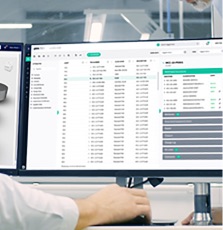



Author: Peter Waywell, Industry Consultant, Datum360
And it’s quite a journey……
It’s fair to say that we are all on a digitalization journey, in some shape or form. But is our journey clear? Do we know where we are going? and have we set clear goals and objectives? Do we know where we want to be, or are we happy to just be “somewhere”?
"Would you tell me please, which way I ought to go from here?
'That depends a good deal on where you want to get to go' said the cat.
'I don't care where' said Alice.
'Then it doesn't matter where you go' said the cat.
'so as long as I get somewhere,' Alice added as an explanation.
Oh, you're sure to do that', said the cat, 'if only you walk long enough."
In any journey, no matter what, you are sure to get somewhere “if you only walk long enough.”I think we can all relate to this over the years, decisions that have been made, and directions that have been taken, and whether the actual goals and objectives were clear at the start or even changed along the way. We can sometimes start a journey, without fully deciding on where we want to be. We can also start a journey without fully considering all related and connected elements of that journey – and experience tells us that this is certainly the case when that journey is digitalization.
Wouldn’t that be great…I just need to provide the SatNav with a destination. It knows where I am. I can include some journey parameters and it will work out the rest for me……it will tell me when I’m likely to arrive, it will adapt to any changes in circumstance along the way and adjust accordingly. It will even tell me how much it will cost and provide me with a plan.
Swap a car journey for digitalization and change the objective to “Transform Business Operations” and it’s not that different really.
We still need to know where we are, where we want to get to, and any conditions and constraints that we need to work with. We need to establish costs and produce a plan for our journey. We also need to look at how technology can help us through our journey.
Whether you are Alice and fallen down a rabbit hole, travelling by car to a meeting, or looking at how to transform business operations - you wouldn’t set out on the journey without knowing where you want to be (“The End in Mind”) and how you plan to get there. And you would want to make sure you got the most value from your time and investment and considered all elements that could influence its success.
When it comes to the journey of digitalization it is no different. By approaching it in this way, you will clearly see that information management is a critical part of this journey being successful.
Let’s turn our attention to that now. So, if we are on a journey of digitalisation, what does this mean, and why is information management significant?
Digitalization is the use of digital technologies to change a business model and provide new revenue and value-producing opportunities; it is the process of moving to a digital business.
Gartner's definition of digitalization quite rightly highlights the importance of technology in delivering new revenues and value-producing opportunities; however, to transform to a digital business, trusted information is fundamental. The key here is that it is about both technology and information. Neither should exist as a strategy without the other, yet are companies focusing sufficiently on the ‘Information’ part of this journey? Both elements are essential for this journey to be successful. Are decisions on technology being made before a full understanding exists regarding the information that is needed, and how this information will be used and managed?
If our goal and destination is to digitally transform our business operations, then Digitalization is a key part of that journey. It is about technology, yes. But it is also, critically, about Information.
And we see this being reflected in the organization structure and roles of the companies that we work with. In the past, there may have been an “Information Manager” role – but that was probably the limit. More recently we are seeing many different 'digital' roles appearing, and this is very much reflecting the increased focus on information, the increased focus on the digital journey, and the importance that this has on the organization and its strategy. They are becoming quite senior roles.
Organizations are starting to reflect this in their structure and roles, and the investments being made. But with such significant investments, it is important that there is a clear direction and strategy. As stated, this is a journey, and the objective is to transform business operations – it’s important that we know where we are heading.
It’s fair to say that all organizations recognise the value of digitalization, and the positive impact it can have on business operations. The journey itself isn’t in question, and I suspect every organization has already begun this journey to a greater/lesser extent in some aspects of their business. We have all deployed technology to perform and support different functions in the business. We have all looked at areas of our business where technology can improve the way we operate.
However, the decision making has tended to be localised (e.g. a procurement system, a design system on a capital project, a document management system) to satisfy a particular need. Maybe it’s a requirement on a particular project, inherited from an acquisition, or simply technology that is out-of-date that needs updating or replacing.
The result of this approach though can be characterised by silos of information, disconnected processes, and duplication – not the characteristics associated with digital transformation.
But what about the information that these technologies need, the information they create, and the information they manage? What about who needs this information, how this information can be consumed, visualised, and shared.
The obvious questions are sometimes forgotten.
For any journey that involves digitalization, and the transformation of business operations, the first step must be about the information itself. How much consideration has been given to the information needed to support the business, and how this information is managed throughout the business? Are we asking these key questions:
• What information is needed and why?
• Who/what needs this information?
• Where is the information coming from?
• How will this information be used, shared and managed?
Before we set off on our journey of digitalization (or even if we are already on our way), these questions need to be asked and answered and should be a fundamental part of how we plan to transform our business operations.
The language of digitalization and digital transformation
By asking, and answering, these questions, it has a direct impact on the language that we use. We start to talk in terms of sharing, collaborating, communicating, visualizing. Rather than features and functions of a particular technology, or steps in particular processes, we can start talking about….how information is created, how people and processes access and share this information, how we collaborate and communicate internally within our business but also with external companies and partners. We can also start talking about how this information is managed, and how the information that is key for decision making can be trusted.
This is the language of digitalization and digital transformation, and this is why Information Management is such an important first step.
How is your digitalization journey going? You can contact us here if you would like to discuss further.



The Datum360 platform provides effortless delivery of your Engineering Information and Asset Data.